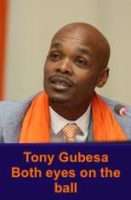Kamogelo Lebeko, 26-year-old PhD candidate at the University of Cape Town (UCT) is making moves in Science and Medicine, breaking ground for Africa and proving that women really can do it all.
She began her studies at UCT in 2009, doing a Bachelor of Sciences in Genetics, then completed her Honours in 2013, and is currently busy with her Doctorate in Human Medical Genetics. Lebeko stresses that she is not studying Medicine to become a General Practitioner or specialist to work with patients in a surgery or hospital scenario, but that her studies cover the research of certain medical advancements in Sub-Saharan Africa.
Childhood and background
Lebeko spent most of her early childhood in Johannesburg, and then her family to Pretoria when she was 13 where she completed her high schooling career.
Lebeko has five other siblings and is the middle-child of her close-knit family.
“I have four siblings, of which I am the middle of five. An older brother and sister as well as a younger brother and sister. I come from a stable home where both my parents have been in my life since I was born and have lived together since I was three years old.”
Both her parents, who are University graduates and successful in the fields of business, and her uncle, who lived in Cape Town and encouraged her to study at UCT, inspired her to do well at school and attend one of the best universities in South Africa.
Why she chose Health Sciences
Lebeko attended Uitsig High School in Centurion, and was around 14/15 when she knew that she wanted to go into the field of Science.
“Being an ‘A’ student, I had many options in terms of the kind of career I wanted to go into. I started learning more about natural sciences and became more fascinated by biological systems.
“I definitely had a curiosity for how things work and DNA seemed pretty awesome because it is the molecule of life. That made me ask, ‘What is DNA?’ As the years progressed and I took up Life Sciences, I learned more about its role in the field of genetics, and I wanted to know more about it, so I applied to do a degree in it.”
Work in the field
In 2015, Lebeko worked as a Research assistant on the H3Africa project, funded by the NIH, which is the US government’s department that drives and funds health related research.
“The project works on Sickle Cell Disease, which is a lifelong disease affecting millions of Africans, and has no cure and very little treatment. Ultimately I was able to organise two international workshops with delegates from all over the world.
“Right now I’m working on my PhD project investigating the genetics behind deafness. We are trying to uncover the most common genes and mutations in Black Africans resulting in patients being born deaf. We hope that by uncovering these mutations, we can screen new-borns and be able to identify them at birth as having deafness or not. This is to help parents and care givers to prepare for the needs of the child.”
Work with Dikakapa
Lebeko also works as the Chairperson of Dikakapa, an NPO founded in 2012, aiming to inspire learners to make a success of their lives.
“Dikakapa encourages the use of education as a tool to transform both learner circumstances as well as the communities they come from. This was inspired by the often lack of positive role models black learners have in their immediate environment. We have published a book which is a collection of 25 short autobiographies from individuals who have walked the journey to success, and overcome their challenges and adversities to reach their goals.”
Although she’s already achieved so much, Lebeko still has many hopes and dreams for her future.
“Ultimately, I’d like to have my own NGOs that work to assist young black people and vulnerable women.”
Final words of inspiration: “If one has a fire burning inside them, nothing can stop them. Perhaps we should look for goals and dreams that push us even in the face if the darkest challenges. Being great needs hard work, and patience. Where there is a will there is a way.”



